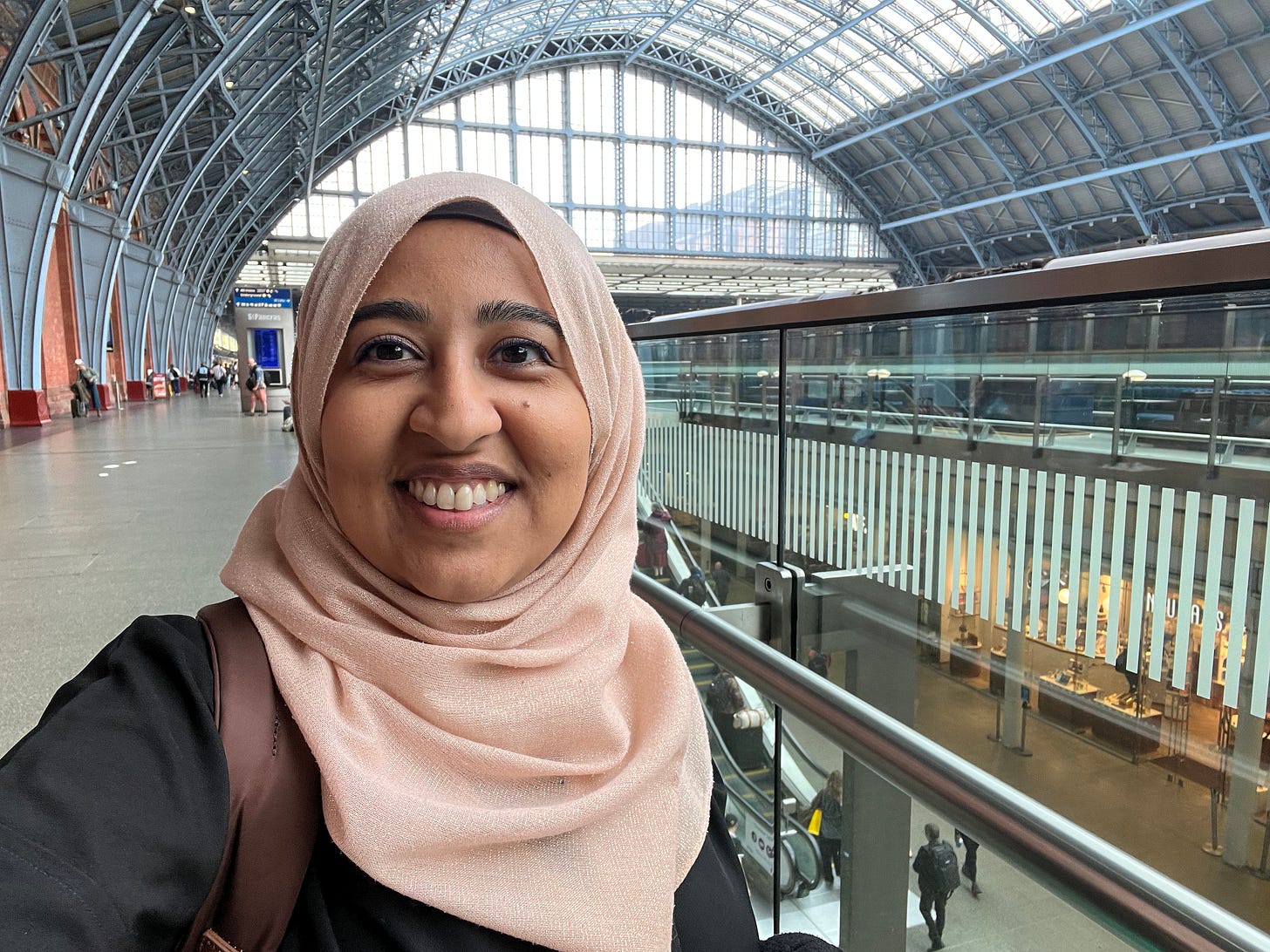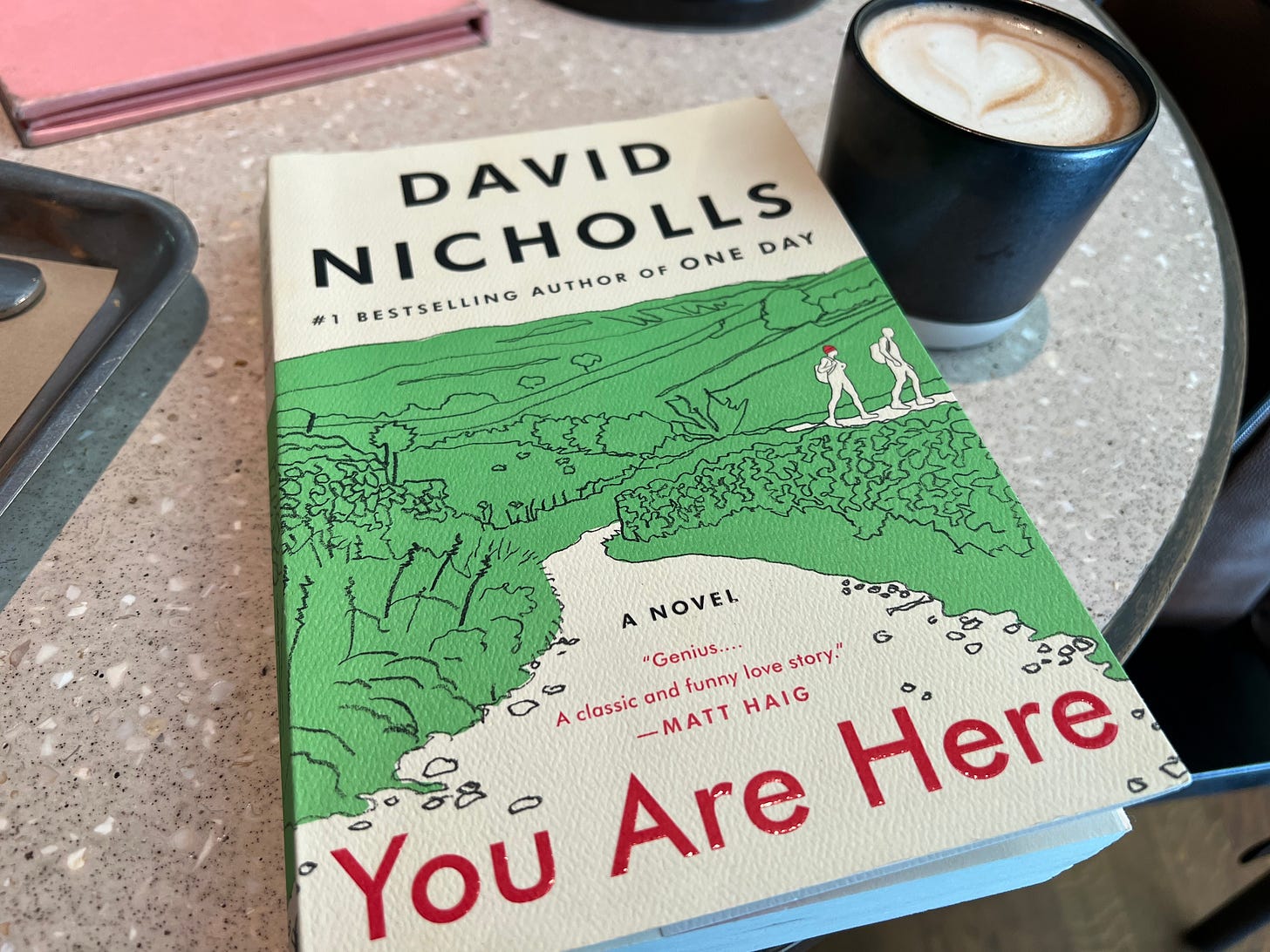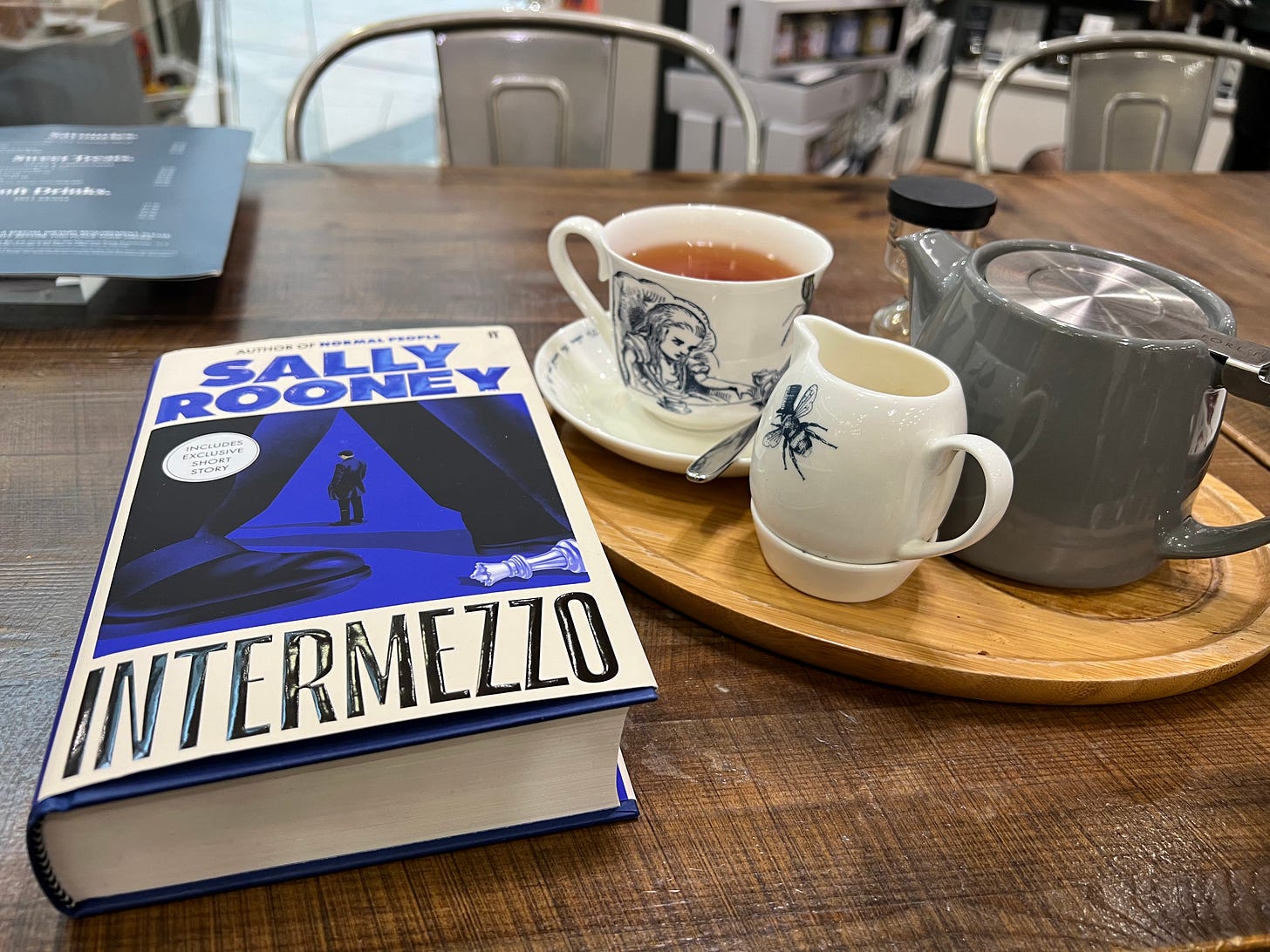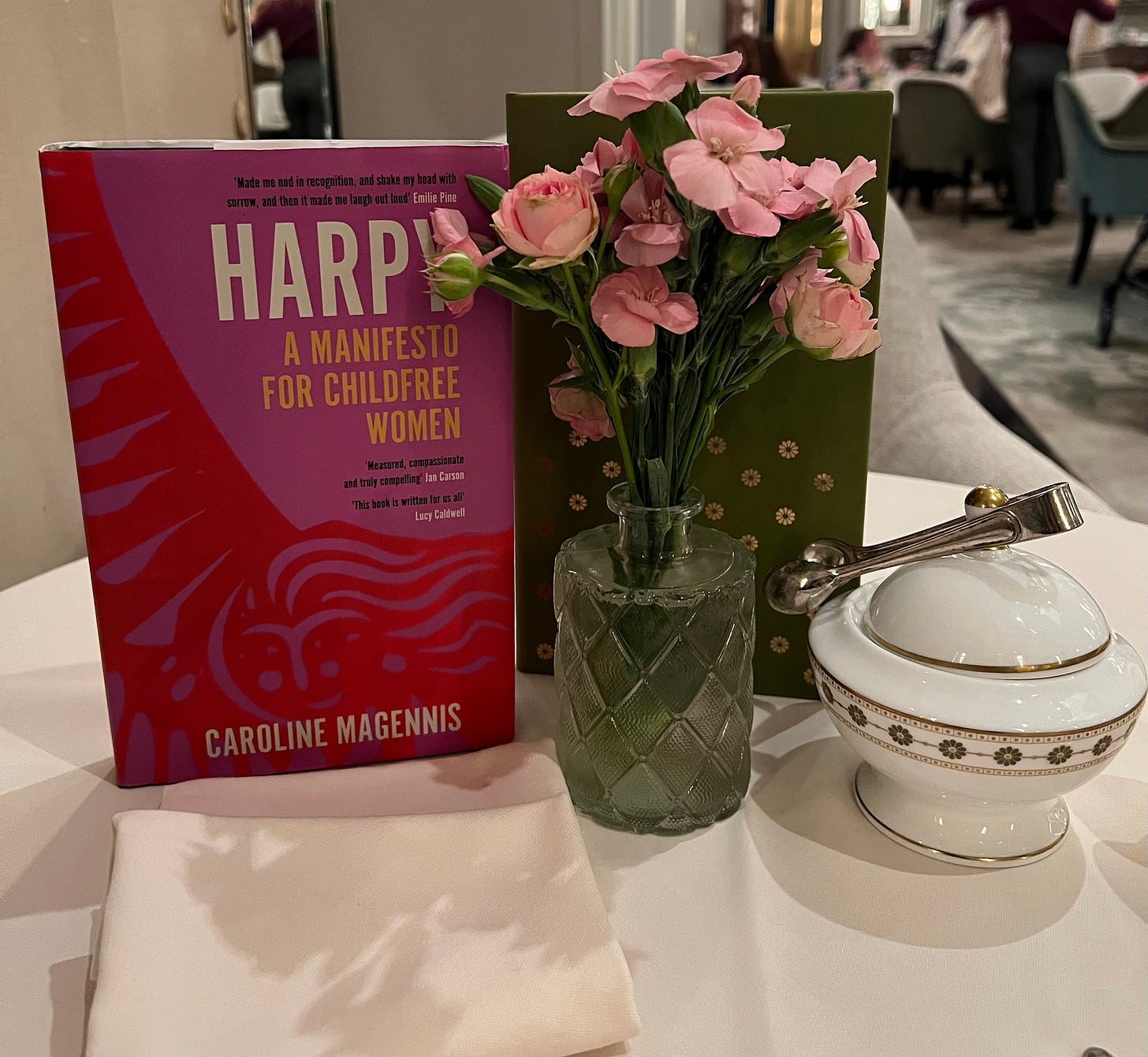Moving Towards a Preferable Future
On the end of medical leave, the (good) books along the way and a Doctor who style rebirth.
Loss is a type of death that I find births new things, and over five very different miscarriages, every miscarriage I’ve ever had has prompted a Doctor-who style regeneration of self. The past eight months have been exceptionally hard on a personal front, the whole year heartbreaking because of genocide, and my latest loss was just one event in a string of recent hard things. Nevertheless, this loss has changed me, and part of regrowing myself involved spending September in the UK, solo for the most part. When I wasn’t alone, I spent time with elders, eager to understand the later decades of women and men in my family, asking questions about my grandparents, and trying to glean as much wisdom as I could during visits that were far too short. It was an eye-opening experience. In October, I went to Toronto for the briefest of visits to do the same thing.
This weekend I spent three days with my parents before and during a health care appointment and during that visit three things became apparent. The first, is that as humans, as mammals, we exist in a web of relationships, and we co-regulate one another. We need other people to survive and to thrive. We need other people to bolster us through difficult times, to help us build our courage, to provide acts of service. We need well-wishes of others, we need prayers, and that base of friendship and companionship helps us to make sense of our lives and to be our best, most courageous selves. The second reflection was that our minds are powerful and we have the ability to create our own realities. We can improve our experience of hardship through determination, reframing our situations and through inner strength. We are more powerful and stronger than we realise, but we cannot survive alone. Finally, through observation I learned the power of accepting people as they are, and not surrendering one’s inner climate to anyone else. I watched delays that left me feeling irritated and upset and angry, and saw my parents in contrast in calm acceptance, thanking every single person, whether a nurse or a receptionist or a doctor or anyone else, and sidestepping mistakes or errors, embodying an attitude of “if they/this situation could be different, they/it would.” That kind of power requires meditation, a spiritual centre, a sense of rootedness and inner dignity that involves placing one’s reliance and centre elsewhere. Watching it I realized: I want more of that within myself.
Recently I heard the first episode of a podcast called Introduction to Future Feelings with Radha Mistry and Nu Goteh, and in the episode, the hosts talk about how setting aside futurism tools or methodologies, the idea of futurism offers anyone the idea that “there is a preferable future I want to move towards rather than a future moving toward me.” Exerting one’s agency and power when one cannot change the circumstances and conditions around oneself matters, even as we reject ideas and narratives of individualism and toxic positivity. And as I enter the third year of this paid Substack, the thing I am interested in most of all in exploring in my writing is what it means to cultivate joy amidst hardship in one’s life and on the planet and how to move towards a preferable future.
Part of the preferable future I am moving towards means working with others. I’ve been in my consulting practice for a number of years now, and recently I’ve found myself wanting to work with others in a more collaborative way. And so for the next year I will be doing exactly that, and am starting a role soon where, God-willing, I will work on strategic equity initiatives with other people in joy-centred ways. I’m looking forward to seeing how time within an organization will shape my consulting practice and vice versa.
No matter where I go, books accompany me, and in the past couple of months, without intending to I’ve been reading books that interrogate the idea of normalcy and a “regular life”, and are about people expanding their worlds and exploring what is possible. In Richard Osman’s newest book We Solve Murders for example, we meet Steve Wheeler, a widower who is a retired police officer (despite not liking police officers I do like him) who lives a set, circumscribed life. He goes to the same places, speaks to the same people, and is reluctant to alter his routine very much. He adores his daughter in law Amy Wheeler, and over the course of this mystery we see Steve unfurl and ask questions about what being a widower should look like, what it means to continue to be faithful and remember his spouse, and what risks he is comfortable with taking.
In You Are Here by David Nicholls, we meet Marnie, a non-hiker who undertakes a group hike – first because of the pressure of friends, and then in a much smaller duo simply because she wants to challenge herself. She is 39, single, without children, works from home and has been invited by a friend to do this hike so that she is shaken out of her regular patterns of living. This hike is led by Michael, 42 who deals with his grief from divorce by walking, and is being forced by his friends to spend time in new company. It is a tender, lovely book that I thoroughly enjoyed. (It is also a book that is described online and in reviews about a “middle aged couple”, or a couple in “midlife” which I confess gives me a jolt every time I read it. When did 39 become middle age?)
In Sally Rooney’s latest book Intermezzo, we meet brothers Peter and Ivan, who struggle throughout the book with what they want and what they believe is societally acceptable. Peter is in love with two women: Sylvia, a six year relationship from his twenties that ended abruptly in the aftermath of a terrible accident, and Naomi, a woman in her twenties who he lives with. Ivan is his younger brother, a chess genius who in love with Margaret, a 36 year old woman who he meets at a chess tournament. Both men are grieving the loss of their father, and independently are struggling through what they are allowed to want and the appropriate parameters of a life.
In Harpy: A Manifesto for Childfree Woman, Caroline Magennis traces the journey of women who may like children but do not want them, and are intentionally childfree/childless/without children (insert the least annoying term for people without kids). I loved this book and found it a fascinating exploration of what it means to be in your late twenties, thirties and forties and constantly hear other people’s intrusive questions in social and familial settings, at work, and in every other setting one might imagine about the shape of your family. It’s about what it is like to navigate assumptions, pitying looks and limited representations of women without children in pop culture, myths, etc. This is a book about asking oneself the question: “What kind of a life do you want to live?” and I found it to be fascinating, thoughtful and textured book.
To watch
Ludvig (streaming on BBC iPlayer): One of the most delightful shows I’ve watched in a long time, this cozy crime drama features UK comedian David Mitchelll, a puzzle master named John who stands in for his twin brother James who is a detective who has gone missing. To figure out what happens, he impersonates James and solves crimes while trying to work out the larger mystery at hand.
What’s in An Accent with Lupita Nyong’o: I found this video of an conversation with Lupita Nyong’o to be full of insights, and I found myself taking lots of notes! Some of my takeaways are below:
Takeaways From This Episode:
When speaking about not letting other people’s bad treatment of you infiltrate your subconscious: I have a disbelief that I am unwelcome. My default is not to feel unwelcome, my default is to seek welcome. I don’t look for rejection, I experience rejection.
When talking about coming to the US for drama school auditions and seeing other people’s nervousness: “I have come too far to be worried about you, you and you. I know what I know, I don’t know what I don’t know, and they (the interviewers) are either going to say come or go home. I don’t have time for self doubt.
In the program when people were “fretting” about course requirements: I don’t have time for this. I have to make the most of it. I can’t let someone else’s doubt stop me. I can’t let my own doubt stop me.
When experiencing rejection in auditions or in the program: I had to externalize the rejection and not inflict myself with the rejection. My value doesn’t come from what I’ve achieved it comes from who I am and who I am continually trying to be.
We Live in Time (In Theatres Now): This delightful movie jumps between different timelines that involve the two main characters Almut and Tobias, who have just found out that Almut’s cancer has come back. We then see their meeting, the earlier cancer diagnosis, the expansion of their family, all within the backdrop of an aggressive form of cancer. It’s a beautiful film about the preciousness of life, the limited time we have with everyone we love, about legacy, and what it means to live one’s life fully. I didn’t cry, but during the screening, through the cinema you could hear people sniffling and choking back tears.
Thank you for your patience while I’ve been on leave. I’m back now, and looking forward to rich conversations with you this year.
Till next time,
Shagufta






May Allah taala bless you with good health happiness and contentment ameen
Grateful for your writing. Thank you